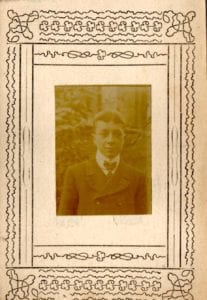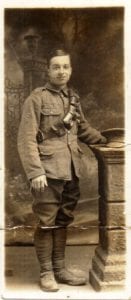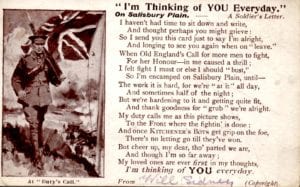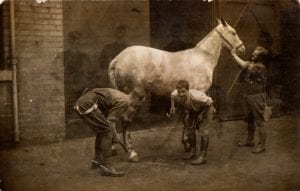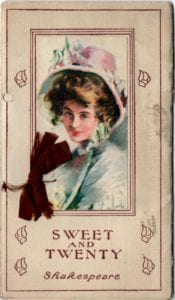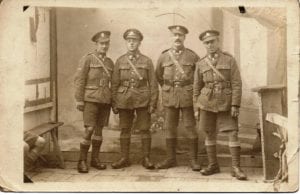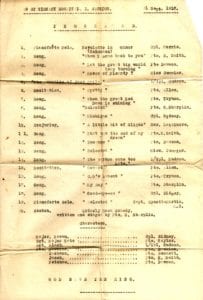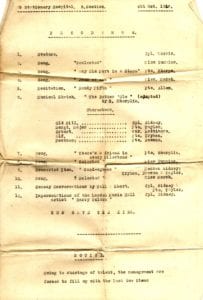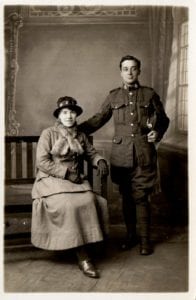With Love to Ethel: the story of Shoeing Smith/Private William Preston Sidney
Few of the men and women who served in the First World War left written evidence of their experience and many rarely ever spoke about it afterwards. The British Army kept records of service but unfortunately, more than half of these documents were destroyed in 1940, when a German bombing raid struck the War Office repository in London. Years later, descendants may find photographs and be able to reconstruct part of their story from these, as happened with Private Antonio Dellafera. Official diaries were kept for most of the military units. It is not known how many soldiers kept a personal diary, but these are invaluable for the family historian and often remain tucked away for years, unpublished and unseen. Increasingly, these memoirs are being located, transcribed and the incredible stories of ordinary men and women shared. William Preston Sidney was one of those men and this is his story. He served in France, Flanders and Italy and there is an incredible link with the hospital in Turin.
Early life
William Preston Sidney was born in Doncaster, Yorkshire on 3 November 1894. His father was Thomas Sidney and his mother, Ada Sidney (née Wilburn). William had 6 siblings, 4 brothers and 2 sisters. In 1901 the family was dispersed as shown by the census and it is thought that this was because William’s mother was in the Southport Convalescent Hospital. However, by 1911 the family was together again, living at 45 Apley Road in Doncaster. William, known as Will to the family, was aged 16 years and working as a Blacksmith’s Apprentice for a company called Hemstock’s, also in Doncaster.
Will’s war
On 8 February 1913, at the age of 19, Will volunteered to join the Territorial Force of the British Army. He was mobilised at Doncaster on 4 August 1914 and embodied as a member of the Queen’s Own Yorkshire Dragoons (QOYD). His rank was ‘Shoeing Smith’ and his regimental number, 2644. In August 1914, the Yorkshire Mounted Brigade, including the Queen’s Own Yorkshire Dragoons, was dispatched to patrol the Yorkshire coast, with the Dragoons responsible for patrolling between Filey and Withernsea. Will moved a number of times, with ‘C’ Squadron, around the East coast, before he finally ended up at Bulford Camp near Salisbury Plain, from where on 19 July 1915, the Company set out on their journey to Le Havre in France.
“I’m thinking of YOU everyday”
Will’s war is very well documented because his service records survived as well as his personal diaries. He was a very conscientious diarist for a large part of his war, sharing details of his locations, his routines and often his innermost thoughts. Will had left behind his sweetheart, Ethel Walshaw, and he was a prolific writer to her. He sent many letters and postcards to Ethel from the day he left her in Doncaster.
The Shoeing Smith
Will served with ‘C’ Company of the Queen’s Own Yorkshire Dragoons for over 2 years and during that time had three postings to France. The first was from July 1915 to June 1916 and the ‘C’ Squadron’s war diary for that period made a number of references to works carried out in respect of the stabling and caring for horses. Some of the photo postcards that Will sent to Ethel show him both with other colleagues and at work with the horses. He returned to England on 13 June and his official war record shows that at some point he was admitted to hospital with appendicitis and was in the Beaufort War Hospital in Bristol. He spent 96 days in hospital before being discharged on 16 September 1916, just a couple of months before being posted back to France for the second time.
‘Sweet and Twenty’
Will left for his second posting to France on Christmas Day, 25 December 1916 and on 14 January 1917, he was transferred as a Private to the 8th Battalion of the York and Lancaster Regiment (Regt No. 32112). It was at this point that he began keeping his personal diary. In addition to brief comments about his work, he made constant references to looking out for letters from home. Ethel was very much in his thoughts. 11 February 1917 was Ethel’s 20th birthday and he sent her a card from France.
Back in Blighty
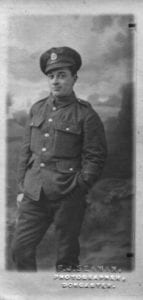
Pte William Preston Sidney in his York and Lancaster uniform April 1917 (Photo courtesy of M & C Dunhill)
Will returned to England again on 5 March 1917 and sometime early that month, he was admitted to Graylingwell hospital in Chichester with pains in his head and limbs, diagnosed as PUO, or Pyrexia of unknown origin. Will was discharged from Graylingwell on 20 April 2017, after being there for 45 days. His next posting was to Sunderland from 30 April. Will was late in reporting to Sunderland and his war record shows that as he overstayed his furlough he was confined to barracks for 3 days and docked 2 days’ pay on 3 May 1917. Will is known to have stopped off at Doncaster on his way through to Sunderland as he visited F J Seaman’s Photographers in Doncaster on 27 April 1917. Although there is no evidence to confirm, it seems most likely that Will would have visited his family and Ethel en route from Graylingwell to Sunderland. Will remained in Sunderland until June when he was posted back to France for the third time, on 9 June 1917.
The ‘Bull-Ring’
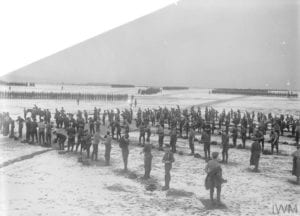
Troops preparing for physical exercise in the famous Bull Ring training camp on the dunes between Etaples and Camiers © IWM Q 33327
On his third posting to France Will was assigned to the 6th Battalion of the York and Lancaster Regiment. Shortly after landing in Boulogne he found himself marching to the ‘Bull-Ring’, in Étaples. This was a particularly notorious base camp for those soldiers on their way to the front. Will’s diary records in some detail the heat, the lack of food, trench digging, the training for gas warfare and the long sessions of route marching across the dunes. One of the most shocking entries in his diary occurred there: ‘June 14th – 8 men dropped dead through heat on the Bull Ring. One Officer shot himself with heat @ Etaples’.
Promotions
On 1 July 1917, Will was transferred to the 9th Battalion of the York and Lancaster Regiment and to his surprise he met up with his brother, Charlie, who was in the same Battalion. Will worked at an ammunition dump, taking shells out of boxes. July and early August were quite uneventful for the Battalion, but Will recorded several camp moves during those weeks, first to Steenvoorde and eventually they arrived at the tunnelling camp at St-Jans-ter-Biezen. Whilst at the tunnelling camp Will described his daily routine of parades, cleaning, inspections, arms drills, musketry practise and trench digging.
On 14 August, Will was recommended for his Lance Corporal stripes. He later wrote of the heavy shelling whilst at Chateau Segard and September saw an escalation of the action for the Battalion, which took part in the Battle of the Menin Road. Will suffered a compound fracture to his shoulder at the end of September, which meant that he escaped much of the action for a few days, but he was soon back to the front line. According to the Battalion war diary, around 10% of the Battalion was either killed or wounded over the 3 day period of 11 – 14 October, the period of the Third Battle of Ypres (Passchendaele). Later that month, on 28 October, the Battalion war diary stated that instructions were received to recall all men from leave, courses etc. On 29 October, Will wrote of rumours of a move to either Egypt or Salonica. On 31 October they were inspected by Field Marshal Douglas Haig, Commander of the British Expeditionary Force. Will learnt that he was to receive his second promotion to the rank of Corporal.
The long march
Shortly after his 23rd birthday on 3 November 1917, Will learnt that he and his Battalion were in fact to be moved to the Italian Front. The Battalion entrained for Italy, from Wizernes station and made a six day journey, through the South of France to Mantua in Italy. In addition to his diary entries, his journey was illustrated by the postcards he collected or sent to Ethel who was always in his thoughts. He passed through Lyons, Marseilles, Cannes and once in Italy, journeyed through Genoa and Cremona before arriving at Mantua (Mantova) on 16 November. According to the Battalion’s war diary the men spent 16-18 November billeted in ‘good’ billets in Cerese, before they started out on what was a 12 stage route march from Mantova to Ciano (over 100 miles, due North) to the front line. Will documented this journey in his diary and they joined the support line on 3 December 1917.
Life on the front line
The early months of 1918 seemed to be an incessant round of parades, kit and billet inspections and more marching, often in very cold weather. On 25 March they left Bolzano and marched to Sarcedo and two days later they made a motorised move to Granezza. The men were trained in hill fighting and remained on the front line in the Asiago sector for several months.
‘In the Dock’
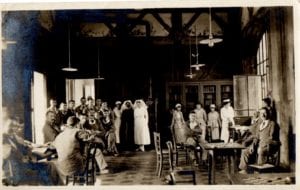
In the Recreation Room of the Turin hospital, Will is standing against the wall on the far right (Photo courtesy of M & C Dunhill)
Unfortunately Will became ill in May 1918 and had to seek medical care, or as he referred to it, he was ‘in the Dock’. He was taken to a casualty clearing station, before being moved by train to the 51st Stationary Hospital (A section) in Genoa. He was there until the end of June, awaiting a Medical Board, with an obvious neck problem as he recorded in his diary. At the beginning of July, he was moved to the 38th Stationary Hospital, also in Genoa, for an operation. Will continued to think about Ethel every day and it was at this point that he decided to propose to her when he returned home: ‘Made up my mind to get married as soon as I get home if Ethel is agreeable’. Unfortunately the first operation did not improve Will’s condition, so despite trying other treatments, the doctors re-operated at the end of August. It was after that operation that Will was transferred to the 29th Stationary Hospital (B section) in Turin, the hospital where most of the Turin Men had been treated before they died.
‘Still in the Dock’
Will recorded his initial impression of the staff in Turin in his diary on 9 September 1918: ‘The sister is worse than awful. The OC is a Bully (a Prison MO in pre-war times). MO no visit’. Despite his obvious unhappiness with the staff, it seems that Will enjoyed the company of the other patients and took part in what appeared to be their regular musical productions. Shortly after his arrival, he played the role of Major Brown and sang at items 9 and 19 on the programme: ‘Michigan’ and ‘Good-bye-ee.”
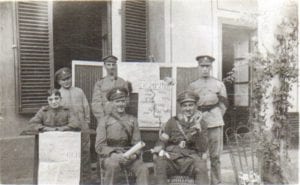
Will, on far left, with others rehearsing a sketch for the concert on 27.09.18 (Photo courtesy of M & C Dunhill)
Later in September, he played the role of ‘Private Jolliboy’, in another production, but his thoughts on the hospital were clear from this diary entry: ‘Still in this prison’. The soldiers appeared to make the most of their concert roles and rehearsed in the hospital grounds. Will kept photos where he and several other patients had rehearsed the award of a DCM to Sgt Major Harry Tate for the concert on 27 September.
October’s concert was entitled ‘A Better ‘ole’, where Will played the part of ‘Old Bill’ and was also involved in the singing, the comedy conversations and an impersonation of the London Music Hall artist ‘Harry Weldon’. His stay in Turin was short-lived as he was transferred to Arquata Base Depot on 8 October. His neck was still causing him pain, he wrote that he was feeling very miserable and unhappy without anything to do and his view of Arquata was: ‘About a dozen houses in a tinpot of a village’. He found himself admitted to another hospital in Genoa, 51st (B) Stationary Hospital, but only for 3 days.
A wedding
It had been a long war for Will, who had been mobilised on 4 August 1914. On 14 November 1918 he was granted one month’s re-engagement leave. The Armistice was signed and November 1918 was also a very significant month for Will and Ethel. After 4 years of war, 3 overseas postings, 6 months in hospital and lots of letters and postcards, Will and Ethel were finally married in Doncaster on 28 November 1918. Unfortunately that wasn’t the end of Will’s war. His leave ended after a few weeks and he was posted back to Arquata, and yet again admitted to 51st Stationary Hospital in Genoa, where it was soon decided to send him home, but not before another hospitalisation in Marseilles, France in the 57th General Hospital. Back in England he was admitted to the Connaught Hospital in Aldershot on 9 January 1919 and discharged on 15 January 1919. Will’s war service finally ended on 29 June 1919.
About the researcher
Carol Dunhill retired from a career in the financial services industry In 2014. Her husband, Martin, is William’s only grandson. One of Carol’s first projects following retirement was to transcribe William Preston Sidney’s diary and research his life in the First World War. Carol has shared his story on her blog, ‘Life of Pottering’, where she also shares stories of her many creative activities.


